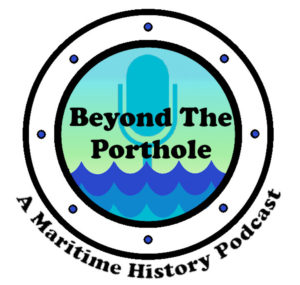 ‘Crimes and Portside’ Beyond the Porthole’s next episode is now live!
‘Crimes and Portside’ Beyond the Porthole’s next episode is now live!
Join us for this next episode of the Beyond the Porthole podcast where we discuss wrecking and smuggling, Charles Dickens and prison hulks, and dive into a wonderful interview about portside prisons with Portsmouth (UK) / Halmstad (SE) PhD student Oscar Kaarlson that includes a rather unbelievable tale involving Swedish kings, cooks and crossdressers!
Listen to the episode here: https://soundcloud.com/user-133437113/episode-2-crime-and-portside
Do you know who the receiver of the wreck is? Or what fish are considered ‘royal’?
This week Daisy leads a discussion about some of the criminal aspects of coastal history that tap into her own research including the legality of wrecking and salvage. We explore who the receiver of the wreck is and what classifies as a royal fish!
Listen to this week’s episode to hear all about some modern and historic examples of ‘whale-wrecking’, Lord John Roders of Winnianton legal quarrels over claret, and the legend of the Wiltshire ‘Moonrakers’.
If you were intrigued by Daisy’s retelling of the classic 1881 poem ‘The Wiltshire Moonrakers’ about the old Wessex smuggling tale by Edward Slow, you can try it for yourself from this short excerpt below. You can also find the complete poem at edwardslow.wordpress.com and enjoy reading the full text or listening to it. Written in a local dialect it is quite a tricky piece.
An jist as thay did heave one out,
Ael at once a feller loud did shout–
HEL’OH, me lads, wat up to there,
NIGHT POACHERS, ah, if teant I swear.
Let goo, zays Will, I’m blow’d if tent,
Vizes excizemen on tha scent;
Push off tha tub var goodness zeak,
Get out tha brook, teak hould a reak;
Reak at tha moon a shinin zee,
An dwoant thee spake, I’ll tackle he,
Bit av ad a mishap as ya see.
Comin frum Vize we donkey cart,
On tha bridge tha donk mead zudden start;
An jirk’d, an jib’d, then gied a kick,
An het bwouth shafts off purty quick.
Out went our things wich as ya zees,
Lays ael about, an yer’s a cheese;
He roll’d rite on straite in thease brook,
An Tom’s a reakun vor’un look!
Tha Zizeman swallered ael o’t in,
An ta zee Tom reakun, gun ta grin,
Girt vool, zays he, as true’s I’m barn,
Why that’s tha moon, thee beest reakun vor’n
An then a busted out agean,
An zed of ael, that beat all clean;
Ta zee a crazy headed coon,
Reak at the shadder of the moon.
Will wink’d at Tom, Tom wink’d at Will,
Ta zee how nice he’d took tha pill;
Ah, zur, you med laff as long as ya please,
Bit we be zure it be a cheese.
If this has peaked your interest there are a two key books that were used as reference for this episode and can recommend reading for further discussion of coastal culture and legality:
Pearce, Cathryn J. Cornish Wrecking, 1700-1860: Reality and Popular Myth. Boydell & Brewer, 2010.
Bathurst, Bella. The wreckers: a story of killing seas and plundered shipwrecks, from the eighteenth century to the present day. Houghton Mifflin Harcourt, 2005.
How Charles Dickens remembered the Prison Hulks.
Join Suzanne as she recounts the daily life of a prisoner on a prison hulk and highlights the connection between some of its most famous boats and Portsmouth. Suzanne also reflects on the visual impact these hulks must have had on its surroundings and the impressions that would have seared themselves into the minds of those who saw them on the daily, most notably Charles Dickens who immortalises them in Great Expectations. By reading a short excerpt from the book and leading a brief following discussion she gives further insight into the impact of the prison hulk both on the prisoners themselves and communities that they were anchored in.
Do you know the tale of a criminal crossdresser who was pardoned by the Swedish King?
Finally, travel to Sweden with Charlotte, where she interviews friend and colleague Oscar Kaarlson on the topic of crime and prisons in portside communities. Oscar, who just like Daisy, is a split-site PhD student between Portsmouth (UK) and Halmstad (SE), is researching portside prisons. He will give insight into the importance of prisons and their development during the 19th century, where the modern prison takes its roots. Oscar not only explains the history of one of Sweden’s most brilliant cross-dressing criminals, but also talks about violence for violence sake.
If you would like to contact Oscar for more information regarding crimes and portside prisons you can contact him via [email protected]
Thank you so much for joining us for this week’s episode!
We hope you have enjoyed it, please feel free to message us or leave a comment in response to something we have talked about or other aspects that may be of interest to our discussed theme!
Join us for our next episode ‘Here be Monsters’ where we will be discussing myth and mythology, early mapping and wayfaring, unknown entities and pre-science discoveries. Joining us next week is Dr Karl Bell talking about his research into superstitious seas, Suzanne speaks with a member of the London Sea Shanty Collective and we visit the National Library of Scotland to discuss why maps depict that ‘here be monsters’.
 Follow the Beyond the Porthole Podcast on Soundcloud, Spotify and Podbean for fortnightly releases! Or follow this link: https://rss.com/podcasts/beyondtheporthole/
Follow the Beyond the Porthole Podcast on Soundcloud, Spotify and Podbean for fortnightly releases! Or follow this link: https://rss.com/podcasts/beyondtheporthole/
Although we hope that you listen to our episodes in their entirety for those interested in a specific area, here are the timestamps for each separate part:
Daisy’s Smugglers: 1:15
Suzanne’s Prison Hulks: 27:30
Charlotte’s Interview with Oscar: 40:20







